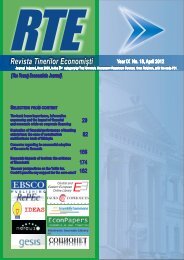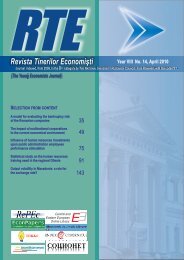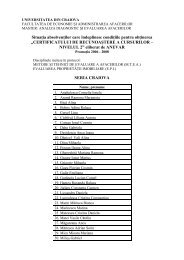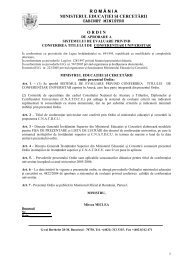Implications of change management in public administration
Implications of change management in public administration
Implications of change management in public administration
Create successful ePaper yourself
Turn your PDF publications into a flip-book with our unique Google optimized e-Paper software.
57<br />
Management – Market<strong>in</strong>g - Tourism<br />
Pr<strong>of</strong>essional practice refers to the response; response to <strong>change</strong>s <strong>in</strong> the<br />
organization does not control or make a lesser extent (ex. legislative <strong>change</strong>s, climate<br />
<strong>change</strong>, social or political).<br />
Expertise - refers to those methods, models, techniques and <strong>in</strong>struments used <strong>in</strong><br />
content or subject matter <strong>of</strong> <strong>change</strong> <strong>management</strong>. It is drawn from sociology,<br />
psychology, economics, <strong>in</strong>dustrial eng<strong>in</strong>eer<strong>in</strong>g, systems eng<strong>in</strong>eer<strong>in</strong>g and behavioral<br />
study. A system is a set <strong>of</strong> elements (components) <strong>in</strong>terdependent between establish<strong>in</strong>g<br />
a dynamic <strong>in</strong>teraction based on predeterm<strong>in</strong>ed rules, <strong>in</strong> order to achieve a particular<br />
objective.<br />
The first and most obvious def<strong>in</strong>ition <strong>of</strong> <strong>change</strong> <strong>management</strong> issues relat<strong>in</strong>g to<br />
manag<strong>in</strong>g <strong>change</strong>. Evidence is not necessarily unambiguous. Manag<strong>in</strong>g <strong>change</strong> is itself<br />
an expression which has at least two mean<strong>in</strong>gs. The first purpose <strong>of</strong> manag<strong>in</strong>g <strong>change</strong><br />
refers to the adoption <strong>of</strong> <strong>change</strong> <strong>in</strong> a planned, structured and organized.<br />
The aim is to implement a more effective methods and systems <strong>in</strong> an<br />
organization <strong>in</strong> full activity. Changes are found to be managed with<strong>in</strong> the organization<br />
and are controlled by it. Perhaps the most familiar example <strong>of</strong> this type is to <strong>change</strong><br />
version control <strong>in</strong>formation system development projects. With all these <strong>in</strong>ternal<br />
<strong>change</strong>s may be triggered by events orig<strong>in</strong>at<strong>in</strong>g outside the organization, <strong>in</strong> what is<br />
usually called "environment".<br />
Thus, the second sense <strong>of</strong> the term <strong>change</strong> <strong>management</strong> refers to the response,<br />
response to <strong>change</strong>s <strong>in</strong> the organization does not control or make a small extent (ex.<br />
<strong>change</strong>s <strong>in</strong> legislation, social or political climate <strong>change</strong>, competition, <strong>change</strong>s<br />
economic, and so on). Researchers and practitioners alike dist<strong>in</strong>guish a reactive<br />
response and an anticipation <strong>of</strong> these <strong>change</strong>s (a proactive response).<br />
The second def<strong>in</strong>ition <strong>of</strong> <strong>change</strong> <strong>management</strong> is "an area <strong>of</strong> pr<strong>of</strong>essional<br />
practice. There are dozens if not hundreds <strong>of</strong> <strong>in</strong>dependent consultants who would<br />
quickly say that they are engaged <strong>in</strong> planned <strong>change</strong>, that <strong>change</strong> agents, they manage<br />
<strong>change</strong> for their customers and that their methods are perfectly consistent with the<br />
practices <strong>of</strong> <strong>change</strong> <strong>management</strong>. There are many small organizations (consult<strong>in</strong>g<br />
firms) whose directors would make such statements with respect to bus<strong>in</strong>ess<br />
organizations. And <strong>of</strong> course, most <strong>management</strong> consult<strong>in</strong>g firms have experience <strong>in</strong><br />
manag<strong>in</strong>g <strong>change</strong>.<br />
Some <strong>of</strong> these experts claim that helps their clients manage the <strong>change</strong>s fac<strong>in</strong>g -<br />
<strong>change</strong>s over which they were subjected. Others argue that it helps their customers to<br />
make <strong>change</strong>s. However others say <strong>of</strong>fers to help by tak<strong>in</strong>g on the task <strong>of</strong> manag<strong>in</strong>g<br />
<strong>change</strong> is adopted. In almost all cases, the process <strong>of</strong> <strong>change</strong> is treated separately from<br />
the characteristics <strong>of</strong> the situation. It is widely recognized that these processes <strong>of</strong><br />
<strong>change</strong> <strong>management</strong> must be performed by agents <strong>of</strong> <strong>change</strong>.<br />
Us away from the idea <strong>of</strong> <strong>change</strong> <strong>management</strong>, the area <strong>of</strong> pr<strong>of</strong>essional<br />
practice, already appears to redef<strong>in</strong>e <strong>change</strong> <strong>management</strong>: <strong>change</strong> <strong>management</strong> content<br />
or subject matter. It consists <strong>of</strong> models, methods and techniques, tools, skills and any<br />
other form <strong>of</strong> expertise beh<strong>in</strong>d any activity. Content or subject matter <strong>of</strong> <strong>change</strong><br />
<strong>management</strong> is drawn from psychology, sociology, bus<strong>in</strong>ess <strong>management</strong>, economics,<br />
<strong>in</strong>dustrial eng<strong>in</strong>eer<strong>in</strong>g, systems eng<strong>in</strong>eer<strong>in</strong>g and the study <strong>of</strong> human behavior and<br />
organizational.<br />
For many practitioners <strong>of</strong> these components are l<strong>in</strong>ked and <strong>in</strong>tegrated expertise<br />
<strong>in</strong> a set <strong>of</strong> concepts and pr<strong>in</strong>ciples known as General Systems Theory (General Systems<br />
Theory). It is not clear whether this area <strong>of</strong> pr<strong>of</strong>essional practice should be called a















